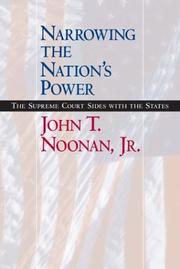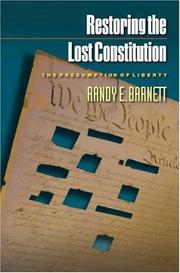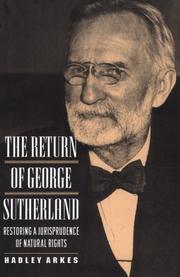| Listing 1 - 4 of 4 |
Sort by
|

ISBN: 1597347698 052093766X 9780520937666 1417508388 9781417508389 9780520240681 0520240685 0520235746 9780520235748 9781597347693 0520240685 Year: 2003 Publisher: Berkeley, Calif. ; London : University of California Press,
Abstract | Keywords | Export | Availability | Bookmark
 Loading...
Loading...Choose an application
- Reference Manager
- EndNote
- RefWorks (Direct export to RefWorks)
Narrowing the Nation's Power is the tale of how a cohesive majority of the Supreme Court has, in the last six years, cut back the power of Congress and enhanced the autonomy of the fifty states. The immunity from suit of the sovereign, Blackstone taught, is necessary to preserve the people's idea that the sovereign is "a superior being." Promoting the common law doctrine of sovereign immunity to constitutional status, the current Supreme Court has used it to shield the states from damages for age discrimination, disability discrimination, and the violation of patents, trademarks, copyrights, and fair labor standards. Not just the states themselves, but every state-sponsored entity--a state insurance scheme, a state university's research lab, the Idaho Potato Commission-has been insulated from paying damages in tort or contract. Sovereign immunity, as Noonan puts it, has metastasized. "It only hurts when you think about it," Noonan's Yalewoman remarks. Crippled by the states' immunity, Congress has been further brought to heel by the Supreme Court's recent invention of two rules. The first rule: Congress must establish a documentary record that a national evil exists before Congress can legislate to protect life, liberty, or property under the Fourteenth Amendment. The second rule: The response of Congress to the evil must then be both "congruent" and "proportionate." The Supreme Court determines whether these standards are met, thereby making itself the master monitor of national legislation. Even legislation under the Commerce Clause has been found wanting, illustrated here by the story of Christy Brzonkala's attempt to redress multiple rapes at a state university by invoking the Violence Against Women Act. The nation's power has been remarkably narrowed. Noonan is a passionate believer in the place of persons in the law. Rules, he claims, are a necessary framework, but they must not obscure law's task of giving justice to persons. His critique of Supreme Court doctrine is driven by this conviction.
Government liability --- State governments --- States. --- Privileges and immunities. --- United States. --- Government immunity --- Government responsibility --- Liability, Government --- Liability, Public --- Liability of the state --- Public liability --- Sovereign immunity --- State liability --- State responsibility --- Tort liability of the government --- Tort liability of the state --- Law and legislation --- Supreme Court (U.S.) --- Chief Justice of the United States --- Supreme Court of the United States --- 美國. --- Subnational governments --- Administrative law --- Administrative responsibility --- Constitutional law --- Liability (Law) --- Misconduct in office --- Public law --- Torts --- Act of state --- Constitutional torts --- State action (Civil rights) --- United States --- States --- Privileges and immunities --- United States. Supreme Court --- State governments - United States - Privileges and immunities. --- 14th amendment. --- america. --- commerce clause. --- common law. --- court majority. --- discussion books. --- federal court. --- legal framework. --- legal history. --- legal studies. --- modern law. --- national legislation. --- nations power. --- nonfiction. --- political science. --- power of the court. --- retrospective. --- sovereign immunity. --- state protection. --- states autonomy. --- states immunity. --- supreme court decisions. --- supreme court doctrine. --- supreme court. --- textbooks. --- united states. --- us congress. --- us constitution. --- us courts.

ISBN: 0691115850 140084813X 0691159734 1306129478 Year: 2004 Publisher: Princeton Oxford Princeton University Press
Abstract | Keywords | Export | Availability | Bookmark
 Loading...
Loading...Choose an application
- Reference Manager
- EndNote
- RefWorks (Direct export to RefWorks)
The U.S. Constitution found in school textbooks and under glass in Washington is not the one enforced today by the Supreme Court. In Restoring the Lost Constitution, Randy Barnett argues that since the nation's founding, but especially since the 1930's, the courts have been cutting holes in the original Constitution and its amendments to eliminate the parts that protect liberty from the power of government. From the Commerce Clause, to the Necessary and Proper Clause, to the Ninth and Tenth Amendments, to the Privileges or Immunities Clause of the Fourteenth Amendment, the Supreme Court has rendered each of these provisions toothless. In the process, the written Constitution has been lost. Barnett establishes the original meaning of these lost clauses and offers a practical way to restore them to their central role in constraining government: adopting a "presumption of liberty" to give the benefit of the doubt to citizens when laws restrict their rightful exercises of liberty. He also provides a new, realistic and philosophically rigorous theory of constitutional legitimacy that justifies both interpreting the Constitution according to its original meaning and, where that meaning is vague or open-ended, construing it so as to better protect the rights retained by the people. As clearly argued as it is insightful and provocative, Restoring the Lost Constitution forcefully disputes the conventional wisdom, posing a powerful challenge to which others must now respond. This updated edition features an afterword with further reflections on individual popular sovereignty, originalist interpretation, judicial engagement, and the gravitational force that original meaning has exerted on the Supreme Court in several recent cases.
Constitutional history --- United States --- Constitutional law --- Judicial review --- United States. Supreme Court --- United States. --- Supreme Court (U.S.) --- Chief Justice of the United States --- Supreme Court of the United States --- 美國. --- Commerce Clause. --- Congress. --- Constitution in Exile movement. --- Constitution. --- Due Process Clauses. --- First Amendment. --- Footnote Four. --- Fourteenth Amendment. --- Gibbons v. Ogden. --- John Marshall. --- Lawrence v. Texas. --- Necessary and Proper Clause. --- Ninth Amendment. --- Presumption of Liberty. --- Privileges or Immunities Clause. --- Slaughter-House Cases. --- Supreme Court. --- U.S. Constitution. --- We the People. --- commerce. --- consent of the governed. --- consent. --- constitutional interpretation. --- constitutional law. --- constitutional legitimacy. --- constitutional meaning. --- constitutional scholarship. --- construction. --- democracy. --- divine right. --- economic liberty. --- federal courts. --- federal laws. --- federal power. --- government. --- immunities. --- interpretation. --- judges. --- judicial doctrines. --- judicial nullification. --- judicial power. --- judicial review. --- judicial supremacy. --- law. --- laws. --- legislation. --- legislative activism. --- liberty rights. --- liberty. --- majoritarianism. --- natural rights. --- necessary and proper. --- necessity. --- original intent. --- original meaning. --- originalism. --- police power. --- popular sovereignty. --- presumed consent. --- presumption of constitutionality. --- privileges. --- proper. --- rights. --- state laws. --- state power. --- unconstitutional laws. --- unenumerable rights. --- unenumerated rights.
Book
ISBN: 0691236216 Year: 2022 Publisher: Princeton, N. J. : Princeton University Press,
Abstract | Keywords | Export | Availability | Bookmark
 Loading...
Loading...Choose an application
- Reference Manager
- EndNote
- RefWorks (Direct export to RefWorks)
"Bruce Carruthers organizes his analysis around different types of credit, offering a roughly chronological discussion of each. The U.S. has always had an economy based on promises, but the manner in which questions about trust and trustworthiness have been posed and answered has evolved in important ways. Their evolution and expansion undergirded the rise of the modern credit economy, but it wasn't a smooth ride forward. Financial crises signalled the widespread collapse of promises, and a collective disbelief in their credibility. Frequently, these collapses motivated public and private attempts to build new institutional scaffolding in support of promises: the 1837 crisis prompted the development of credit ratings; the depression of the 1890s justified passage of a permanent bankruptcy law; the 1907 crisis led to the establishment of the Federal Reserve System; and the Great Depression led to a multitude of public policies in support of financial promises. At various points, political groups perceived the financial system to be deeply unfair, one that privileged some over others. During the 1880s and 1890s, agrarian groups and populists attacked a monetary and banking system that failed to give them adequate credit. During the 1960s and 1970s, women and minorities criticized a discriminatory financial system that denied them full access to consumer and mortgage credit. In The Economy of Promises, Carruthers describes the changes that have occurred, spell out their implications, and explain their significance"--
Credit --- Trust --- History. --- Economic aspects. --- Asset. --- Bank charge. --- Bank. --- Bond (finance). --- Business model. --- Capital adequacy ratio. --- Capital employed. --- Capital expenditure. --- Capital intensity. --- Cash crop. --- Cash flow. --- Commerce Clause. --- Commercial Credit. --- Commodity market. --- Commodity. --- Competition (economics). --- Consumerism. --- Credit (finance). --- Credit Insurance. --- Credit risk. --- Creditor. --- Crony capitalism. --- Currency. --- Current Price. --- Debt limit. --- Debt. --- Debtor. --- Diversification (finance). --- Economic Life. --- Economic development. --- Economic forecasting. --- Economic indicator. --- Economic interventionism. --- Economic policy. --- Economic sector. --- Economics. --- Economy of the United States. --- Economy. --- Employment. --- Exchange rate. --- Fee Income. --- Financial capital. --- Financial inclusion. --- Financial institution. --- Financial instrument. --- Financial intermediary. --- Financial services. --- Financial statement. --- Financial technology. --- Financier. --- Floating interest rate. --- Gross (economics). --- Gross Earnings. --- Gross domestic product. --- Guaranteed Loan. --- Income. --- Inflation. --- Insider Lending. --- Interest rate. --- Investment fund. --- Investment strategy. --- Investor. --- Margin (finance). --- Mark-to-market accounting. --- Market liquidity. --- Market price. --- Market rate. --- Market value. --- Mass production. --- Measures of national income and output. --- Monetarism. --- Money market account. --- Money market. --- Mortgage loan. --- Net capital rule. --- Net income. --- Payment. --- Policy. --- Price index. --- Pricing. --- Prime rate. --- Public finance. --- Purchase Price. --- Purchasing power. --- Rate of profit. --- Rate of return. --- Real interest rate. --- Relative value (economics). --- Repayment. --- Revenue bond. --- Securitization. --- Shareholder. --- Subsidy. --- Supply-side economics. --- Tax bracket. --- Tax reform. --- Trade credit. --- Value (economics). --- Working capital. --- World economy.

ISBN: 0691034729 069121820X 0691016283 Year: 1994 Publisher: Princeton Princeton University Press
Abstract | Keywords | Export | Availability | Bookmark
 Loading...
Loading...Choose an application
- Reference Manager
- EndNote
- RefWorks (Direct export to RefWorks)
In this book, Hadley Arkes seeks to restore, for a new generation, the jurisprudence of the late Justice of the Supreme Court George Sutherland--a jurisprudence anchored in the understanding of natural rights. The doctrine of natural rights has become controversial in our own time, while Sutherland has been widely maligned and screened from our historical memory. He is remembered today as one of the "four horsemen" who resisted Roosevelt and the New Deal; but we have forgotten his leadership in the cause of voting rights for women. Both liberal and conservative jurists now deride Sutherland, yet both groups continue to draw upon his writings. Liberals look to Sutherland for a jurisprudence that protects "privacy" against the rule of majorities, as in matters concerning abortion or gay rights. Conservatives will appeal to his defense of freedom in the economy. However, both liberals and conservatives deny the premises of natural rights that provided the ground, and coherence, of Sutherland's teaching. Arkes contends that Sutherland can supply what is missing in both conservative and liberal jurisprudence. He argues that if a new generation can look again, with unclouded eyes, at the writings of Sutherland, both liberals and conservatives can be led back to the moral ground of their jurisprudence. This compelling intellectual biography introduces readers to an urbane man, and a steely judge, who has been made a stranger to them.
Judges --- United States --- Biography --- Constitutional history --- Natural law --- Sutherland, George, --- Natural law. --- LAW / Constitutional. --- Aristotle. --- Arkes, Hadley. --- Black, Hugo (Justice). --- Bork, Robert. --- Cardozo, Benjamin (Justice). --- Chaco War. --- Cicero. --- Commerce Clause. --- Edwards v. California. --- Federalist papers. --- Field, Marshall. --- Gibbons v. Ogden. --- Gold Clause cases. --- Hamilton, Alexander. --- Heller, Joseph. --- Hoke v. U.S. --- Importation of slaves. --- Jay, William. --- Johnson, Andrew. --- Kidd v. Pearson. --- Lamar, Lucius (Justice). --- Lincoln, Abraham. --- Locke, John. --- Marshall, John (Chief Justice). --- Myers v. U.S. --- National Recovery Act (NRA). --- New State Ice Co. v. Liebmann. --- Peckham, Rufus (Justice). --- Prerogative, executive powers. --- delegation of authority. --- Law of nature (Law) --- Natural rights --- Nature, Law of (Law) --- Rights, Natural --- Law --- Derecho natural. --- Jueces --- Sutherland, George --- Estados Unidos --- ABŞ --- ABSh --- Ameerika Ühendriigid --- America (Republic) --- Amerika Birlăshmish Shtatlary --- Amerika Birlăşmi Ştatları --- Amerika Birlăşmiş Ştatları --- Amerika ka Kelenyalen Jamanaw --- Amerika Qūrama Shtattary --- Amerika Qŭshma Shtatlari --- Amerika Qushma Shtattary --- Amerika (Republic) --- Amerikai Egyesült Államok --- Amerikanʹ Veĭtʹsėndi︠a︡vks Shtattnė --- Amerikări Pĕrleshu̇llĕ Shtatsem --- Amerikas Forenede Stater --- Amerikayi Miatsʻyal Nahangner --- Ameriketako Estatu Batuak --- Amirika Carékat --- AQSh --- Ar. ha-B. --- Arhab --- Artsot ha-Berit --- Artzois Ha'bris --- Bí-kok --- Ē.P.A. --- EE.UU. --- Egyesült Államok --- ĒPA --- Estados Unidos da América do Norte --- Estados Unidos de América --- Estaos Xuníos --- Estaos Xuníos d'América --- Estatos Unitos --- Estatos Unitos d'America --- Estats Units d'Amèrica --- Ètats-Unis d'Amèrica --- États-Unis d'Amérique --- Fareyniḳṭe Shṭaṭn --- Feriene Steaten --- Feriene Steaten fan Amearika --- Forente stater --- FS --- Hēnomenai Politeiai Amerikēs --- Hēnōmenes Politeies tēs Amerikēs --- Hiwsisayin Amerikayi Miatsʻeal Tērutʻiwnkʻ --- Istadus Unidus --- Jungtinės Amerikos valstybės --- Mei guo --- Mei-kuo --- Meiguo --- Mî-koet --- Miatsʻyal Nahangner --- Miguk --- Na Stàitean Aonaichte --- NSA --- S.U.A. --- SAD --- Saharat ʻAmērikā --- SASht --- Severo-Amerikanskie Shtaty --- Severo-Amerikanskie Soedinennye Shtaty --- Si︠e︡vero-Amerikanskīe Soedinennye Shtaty --- Sjedinjene Američke Države --- Soedinennye Shtaty Ameriki --- Soedinennye Shtaty Severnoĭ Ameriki --- Soedinennye Shtaty Si︠e︡vernoĭ Ameriki --- Spojené obce severoamerické --- Spojené staty americké --- SShA --- Stadoù-Unanet Amerika --- Stáit Aontaithe Mheiriceá --- Stany Zjednoczone --- Stati Uniti --- Stati Uniti d'America --- Stâts Unîts --- Stâts Unîts di Americhe --- Steatyn Unnaneysit --- Steatyn Unnaneysit America --- SUA (Stati Uniti d'America) --- Sŭedineni amerikanski shtati --- Sŭedinenite shtati --- Tetã peteĩ reko Amérikagua --- U.S. --- U.S.A. --- United States of America --- Unol Daleithiau --- Unol Daleithiau America --- Unuiĝintaj Ŝtatoj de Ameriko --- US --- USA --- Usono --- Vaeinigte Staatn --- Vaeinigte Staatn vo Amerika --- Vereinigte Staaten --- Vereinigte Staaten von Amerika --- Verenigde State van Amerika --- Verenigde Staten --- VS --- VSA --- Wááshindoon Bikéyah Ałhidadiidzooígíí --- Wilāyāt al-Muttaḥidah --- Wilāyāt al-Muttaḥidah al-Amirīkīyah --- Wilāyāt al-Muttaḥidah al-Amrīkīyah --- Yhdysvallat --- Yunaeted Stet --- Yunaeted Stet blong Amerika --- ZDA --- Združene države Amerike --- Zʹi︠e︡dnani Derz︠h︡avy Ameryky --- Zjadnośone staty Ameriki --- Zluchanyi︠a︡ Shtaty Ameryki --- Zlucheni Derz︠h︡avy --- ZSA --- Η.Π.Α. --- Ηνωμένες Πολιτείες της Αμερικής --- Америка (Republic) --- Американь Вейтьсэндявкс Штаттнэ --- Америкӑри Пӗрлешӳллӗ Штатсем --- САЩ --- Съединените щати --- Злучаныя Штаты Амерыкі --- ولايات المتحدة --- ولايات المتّحدة الأمريكيّة --- ولايات المتحدة الامريكية --- 미국 --- Historia constitucional. --- États-Unis --- É.-U. --- ÉU --- Amerik --- Америк --- Amerikiĭn Nėgdsėn Uls --- Америкийн Нэгдсэн Улс --- ANU --- АНУ --- Северо-Американские Штаты --- Северо-Американские Соединенные Штаты --- Сѣверо-Американскіе Соединенные Штаты --- Соединенные Штаты Америки --- Соединенные Штаты Северной Америки --- Соединенные Штаты Сѣверной Америки --- США --- ЗДА --- Зьєднані Держави Америки
| Listing 1 - 4 of 4 |
Sort by
|

 Search
Search Feedback
Feedback About UniCat
About UniCat  Help
Help News
News